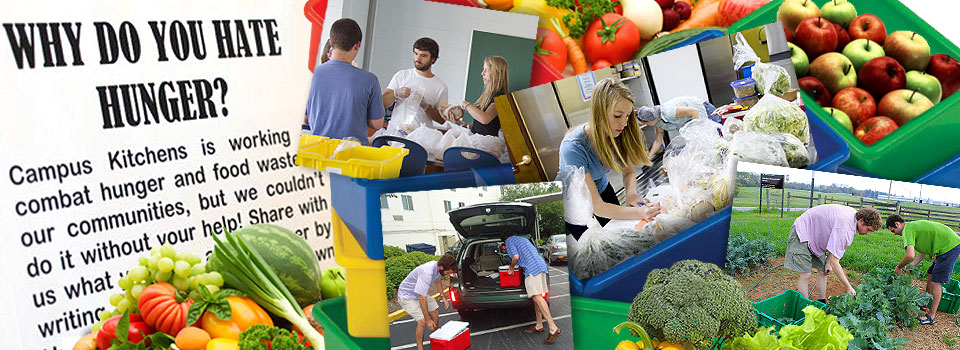Planting a bed of strawberries in the UGArden, picking up surplus bread from Jimmy John’s Gourmet Sandwiches, cooking a meal large enough for 50 in a commercial kitchen or delivering meals to area grandparents raising grandchildren isn’t the typical college homework assignment. But it’s what’s expected in Cecilia Herles’ Environment, Gender, Race and Class service-learning course.
Students in the class learn about food waste, food justice and hunger among the elderly, among other issues. They read about these subjects, discuss them in class-and then go out in the community and conduct research projects to determine how much edible food grocery stores throw out and see how prevalent levels of hunger are right here in Athens, especially among the aging population.
For the past three springs, the service-learning class, along with the Athens Urban Food Collective service-learning course, has helped to set up UGA’s Campus Kitchen project, a student organization based on a national model that takes surplus food from area businesses and transforms it into nutritious supplemental meals for those who need them most.
And in November, Campus Kitchen at UGA became the 33rd branch of the national Campus Kitchens Project.
The UGA chapter feeds about 25 grandparents raising grandchildren. All the families are food insecure, meaning they might not have enough food or have trouble affording groceries or getting fresh fruits and vegetables.
Food insecurity is an overwhelming problem in Athens, according to Eve Anthony, chief operating officer for the Athens Community Council on Aging, whose clients Campus Kitchen serves. Poverty is an issue, so is access to food. And even then, Anthony said, it’s a matter of adequate and appropriate food. “Are seniors getting fresh fruits and vegetables or living on frozen meals?” she asks. “If they have diabetes, are they eating right?”
With grandparents raising grandchildren, the problem is compounded.
“Typically, they’re raising the children on one income, often Social Security,” Anthony said.
The idea of Campus Kitchen is to provide supplemental meals in addition to food that the Meals on Wheels program might bring. It’s not food every day, but it’s enough to help.
Families on the program get deliveries every two weeks and get about two to three meals per person, plus a loaf of bread and some fresh produce.
And just in the last month, more than 300 UGA students have collected almost 20,000 pounds of surplus food and transformed it into 3,900 meals.
Meals range from flank steak with mashed sweet potatoes to pesto chicken and mixed greens. It all depends on what’s donated by local businesses like Trader Joe’s and Fresh Market and what the UGArden yields: tomatoes and cucumbers in the summer, squash and greens in the fall.
For local businesses, donations include meat at its sell-by dates that stores can no longer sell but can be safely frozen until it is ready to cook. A bag of oranges with a rotten orange or a carton of eggs with one or two broken eggs also isn’t sellable, but Campus Kitchen will gladly discard one orange or the broken eggs and distribute the remaining food to local grandparents and their grandchildren.
At the Georgia Center for Continuing Education, when groups overestimate their attendance for meals, the extra meatloaf, baked chicken, vegetables, breads and desserts are donated to Campus Kitchen instead of being thrown away.
The meals are cooked in a commercial kitchen, either at Talmadge Terrace or Jittery Joe’s bakery. Volunteers don hairnets and gloves and learn all about food safety-how to sort food, when food needs to be thrown out or when it can be salvaged. They learn that some expiration dates-like those on canned goods-can be stretched and some-like those for prepared food-are a strict seven days. For meat, freezing will extend its life well beyond its sell-by date.
Then, in two hours, student volunteers cook batches of chicken large enough to feed 52 people. Following recipes planned by dietetics students, they bring frozen pancetta and bread in from a walk-in freezer, basil picked fresh from UGArden and seasoning from their own pantry to create nutritious meals and meet national guidelines: each having a protein, vegetable, starch and dessert.
So Campus Kitchen plans events to bring the families together, to give the grandparents a chance to interact and the grandchildren a chance to play. Student volunteers take the grandchildren on outings, to tour the UGArden to see where their fresh vegetables come from and make a salad from freshly harvested greens.
Katie Faulkner, a senior women’s studies and art history double major, was in the service-learning class this spring. She’s stayed on in the organization’s leadership and helps plan fundraisers and activities like group meals.
Even with her full class load, Faulkner makes the time for Campus Kitchen.
“For me, I wouldn’t want any child to go hungry,” she said. “I don’t think it’s right. It’s the people who need the nutrition the most-the youngest part of our population and the oldest part of our population, which is who we feed.”
To donate money or food, contact Sarah Jackson, Campus Kitchen coordinator, at sarjack@uga.edu.


